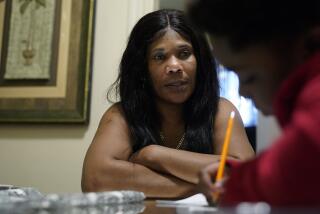Education Matters: You need to tell your child’s teacher about your divorce
- Share via
The school year is just beginning, but grades are already in on parent-teacher communication: needs improvement.
There’s a crucial disconnect between parents and teachers, both vital players in a child’s growth and development, according to the results of a new survey. VitalSmarts, a corporate training and leadership development company, surveyed 689 parents and 174 teachers from its national database of subscribers.
The results: Teachers feel parents aren’t telling them about the major changes in the home that affect the students in their classroom. Parents feel teachers don’t share revealing details about their child’s behavior at school.
But why would, say, an English teacher need to know that a student’s parents are divorcing?
“Teachers just sort of expect that they’re going to be told” about life-altering events in their students’ lives, said David Maxfield, vice president of research and one of the study’s co-authors. “The teacher wants to get updated on that kind of information because that has such a profound impact” on the child.
In fact, 94% of teachers surveyed felt it’s important for parents to inform them of a divorce or other rupture in the marriage. But only 23% of divorcing parents surveyed said they shared that with the teacher.
“When we talked to parents, the kinds of things you hear are, well, ‘I don’t really have a relationship with the teacher ... besides, what’s the teacher going to do, anyway? They’re not going to mend my marriage,’” Maxfield said.
But, he said, consider how a divorce could affect the child and how that might manifest itself as disruptive behavior in the classroom. A teacher, without knowing what’s going on at home, would probably respond to that outburst as simply a behavioral problem, without knowing that the episode is rooted in something deeper.
If the teacher has context from parents, he or she can be more understanding. So when a child acts out, Maxfield said, an educator can address the root cause of the disruption when it occurs.
Other areas where there was a breakdown in communication: when someone in the family has a major illness or accident; a death in the family or a change in the child’s mood, such as depression.
Parents, on the other hand, said they felt in the dark about what their children were experiencing in the classroom. With teachers spending the bulk of the day with their kids, parents said they wanted to hear from teachers if they suspected problems, such as drug use, depression, autism or cognitive disorders.
The biggest obstacles in parent-teacher communication, the survey found, were a lack of relationship, shame about personal circumstances or a desire for privacy, scheduling challenges and a “what’s the point” sense of futility in talking.
Of course, the point of improved communication between teachers and parents is to create the best experience and environment for the student.
“The more the teachers understand the context of [children’s] behavior, the more successful they can be at their jobs,” Maxfield said.
What are you doing to create and maintain the lines of communication between school and home? Share your thoughts and questions in the comments.
Going through the growth spurts and growing pains of parenthood? Join me on the journey: @mmaltaisla
More to Read
Sign up for Essential California
The most important California stories and recommendations in your inbox every morning.
You may occasionally receive promotional content from the Los Angeles Times.











